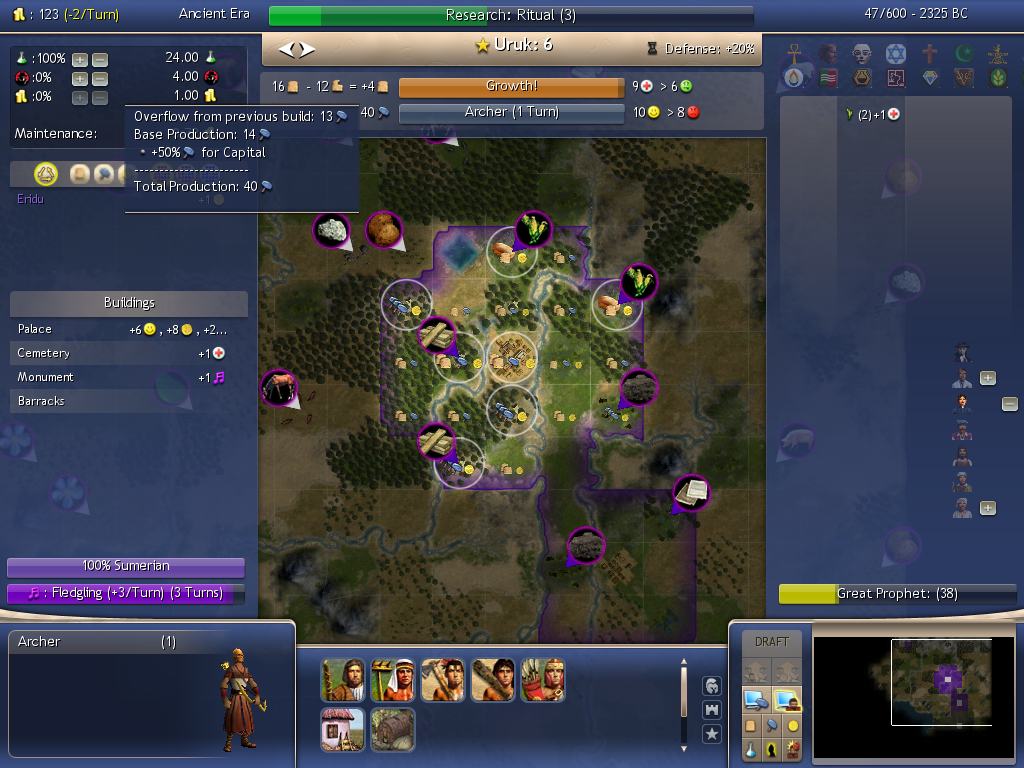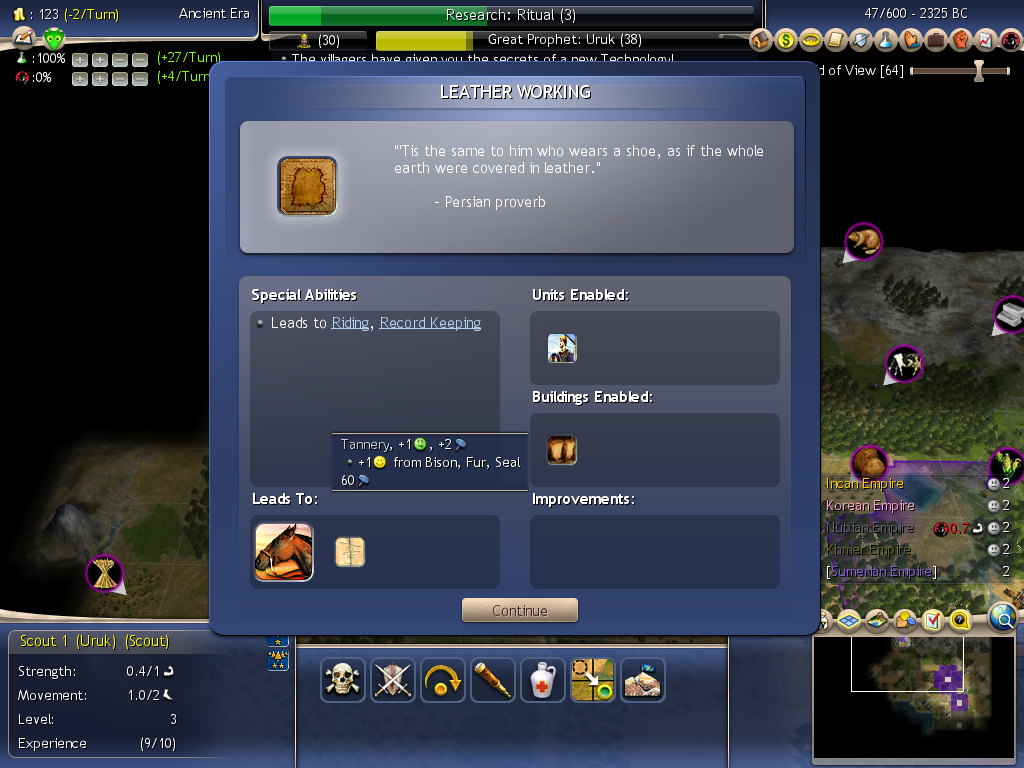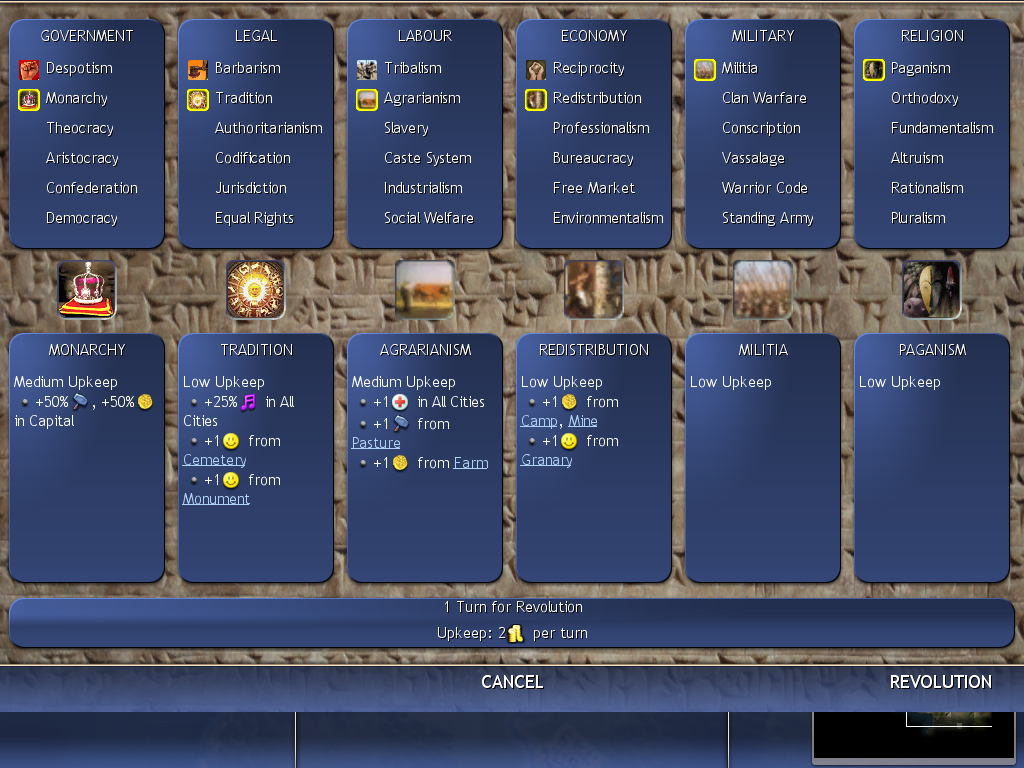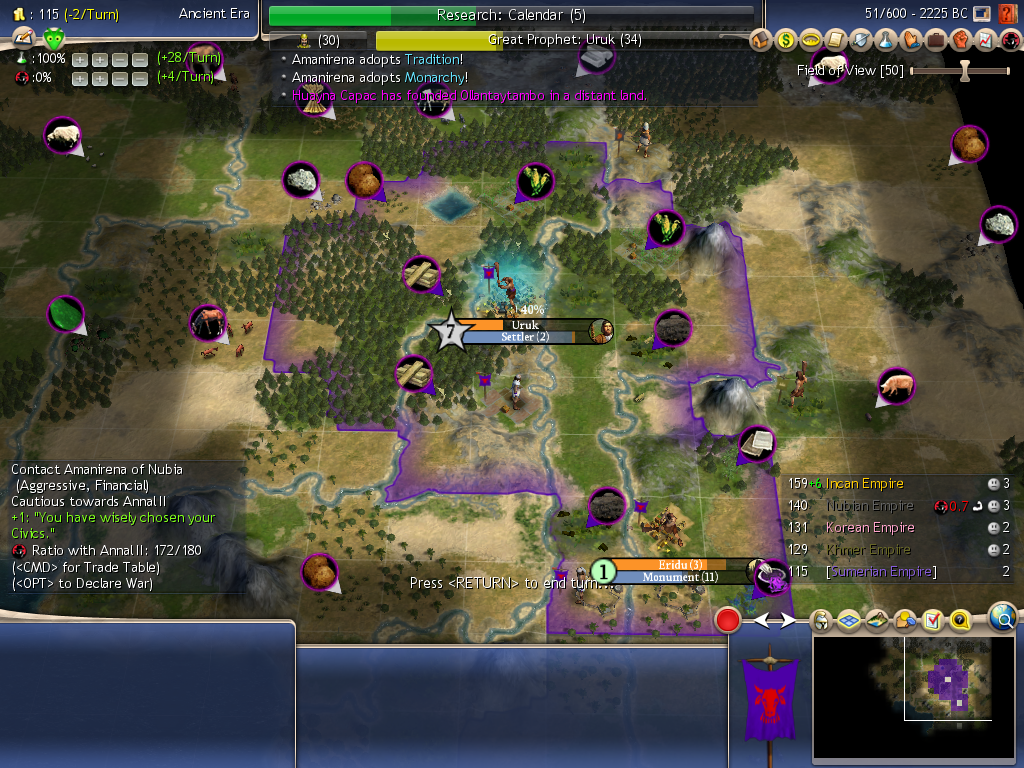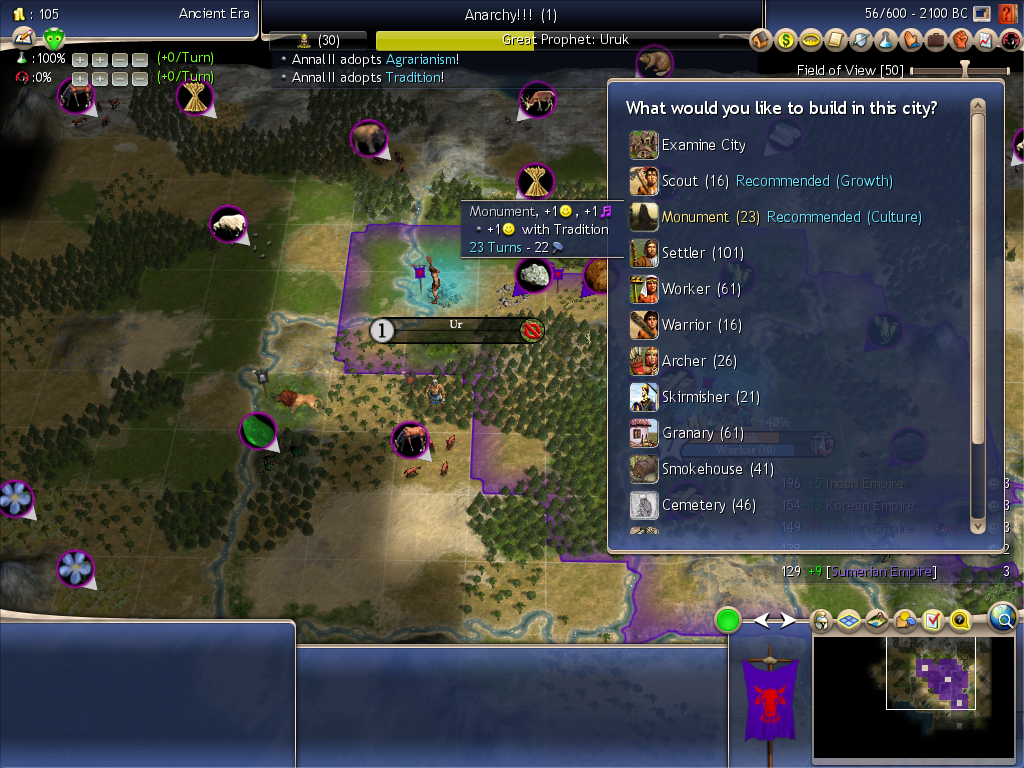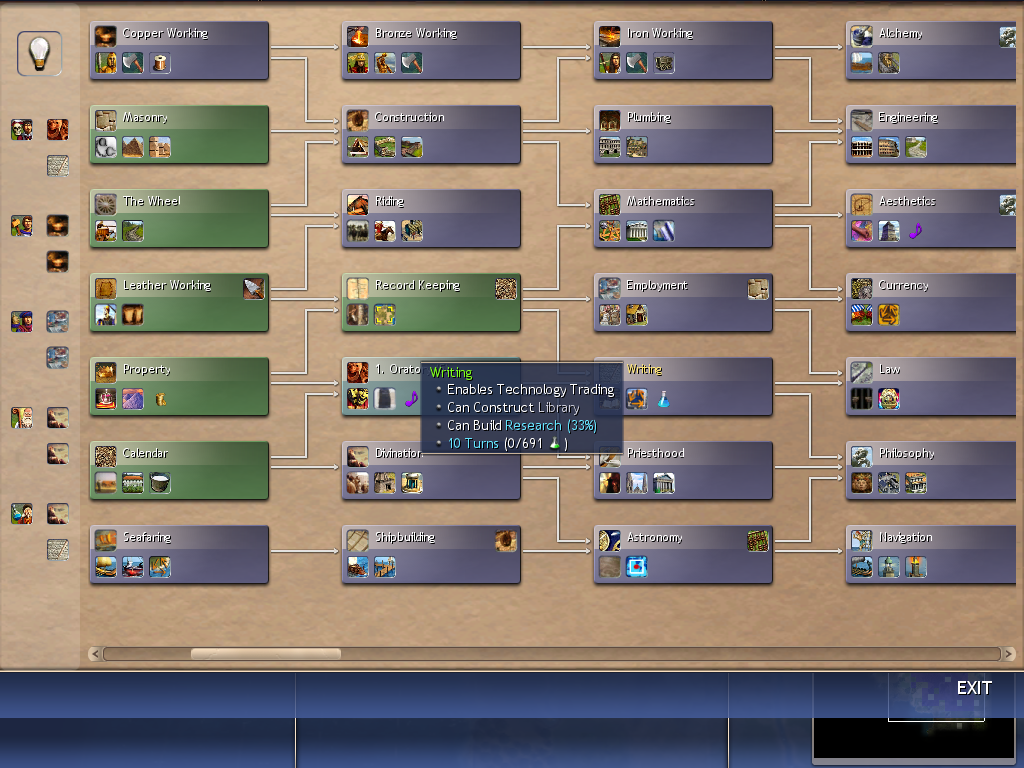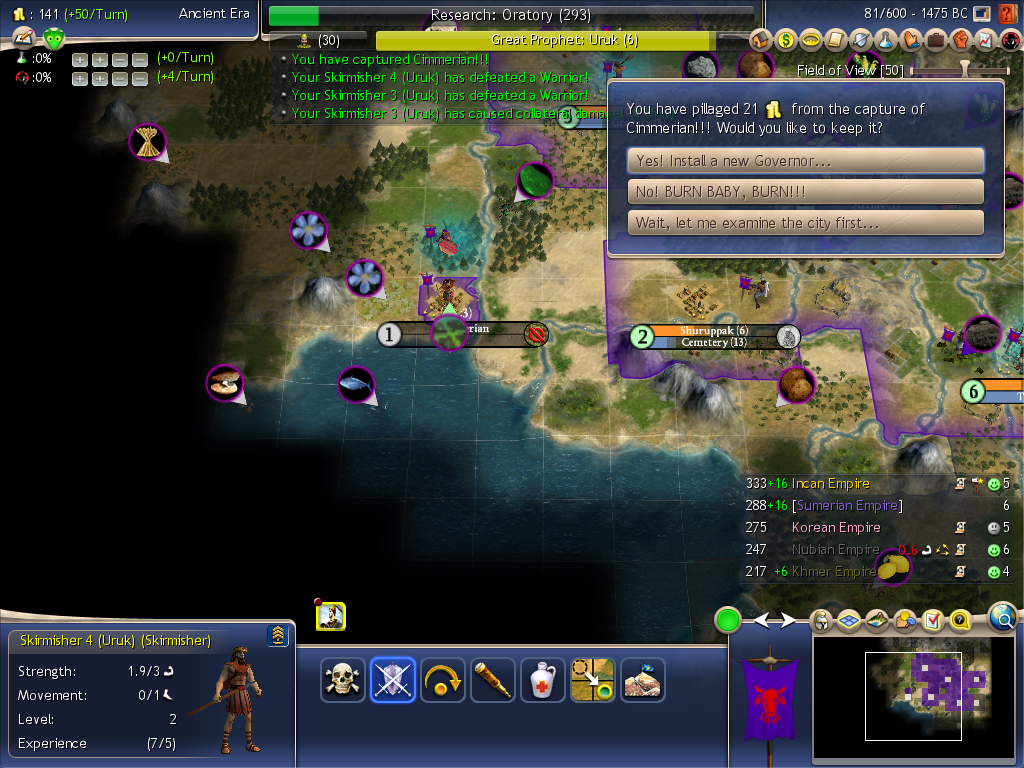ANNAL II: Gilgamesh of Sumer
Chapter 3: Sumer Against the Barbarians
After Property, I begin research on Archery. Barbarians on Immortal are no joke, I'm thinking. I'll need something better than Warriors to hold them off.
As if on cue, my Scout meets a barbarian Warrior two turns later. Thanks to his Woodsman promotions, he survives! I've explored all the territory near Uruk, so the Scout heads further west.
Meanwhile, a Khmer Scout reaches Uruk from the south and I am introduced to Jayavarman. He is Creative and Humane: another peaceful leader.
Around the same time, Toynbee declares that I am the least powerful civilization in the world.
Annal II the Hopeless, he calls me. Glorious Capac of Inca with his Quecha armies is first. Mediocre Amanirena of Nubia is fourth.
Thank you, Toynbee. I've got the message. I'm working on it! Fortunately, Uruk under Monarchy civic can construct a Barracks and train Archers
very quickly:
Note the Camps I've built all around Uruk, adding one commerce to those Forests.
My only other options are to build Orchards, for one extra food; or chop down the Forests and build Farms, for one extra food plus one riverside commerce, in exchange for one hammer.
(Cottages and Workshops won't be available until the Classical Era. Lumbermills, which will give me access to all that Prime Timber, won't be available until the Medieval Era!)
Since I have plenty of food from Corn, I'll stick with Camps. Here's hoping I discover some Bison, Deer, or Fur!
My Scout visits his fifth tribal village and stumbles upon a new technology: Leather Working. (He is slain by another barbarian Warrior shortly thereafter.)
I mourn for the Scout but it is still excellent news. Leather Working is state-of-the-art technology, well worth the sacrifice. I might be the first nation in the world to discover it.
Leather Working unlocks the Skirmisher unit, which I'll discuss later, and the Tannery building, which provides a few hammers and bonus happiness from three early resources.
There are Bison and Furs in the tundra north of Uruk, so I expect to build Tanneries in every city in Sumeria. Best of all, Leather Working, together with Property, leads to Record Keeping:
Record Keeping enables the last of the early game civics, Redistribution. I've already researched Ritual and Calendar, unlocking the Tradition and Agrarianism civics.
Together with Monarchy and Redistribution, they are the foundation of a solid Ancient Age economy. Here they are in all their glory:
The other leaders are also racing to adopt these civics. In 2225 BC, Amanirena adopts Monarchy/Tradition. Monarchy is her favourite civic: another reason she makes for a great ally.
I counter by founding Ur, claiming Potatoes, Stone, and Wheat (Gotta love that 22 hammer Monument!); and adopting Tradition/Agrarianism, following up with Redistribution ten turns later.
Ur could have claimed more resources; Bison, Cattle, and Sheep stand just outside its borders. But I'm playing the long game, spreading out resources across multiple cities.
All those civic changes - bonus commerce from Farms and Camps, bonus hammers from Pastures, bonus happiness from buildings - vastly improves productivity in Uruk, now a size 8 city.
I alternate between training Workers and Settlers, taking advantage of those high tile yields; and constructing new buildings, letting the city grow and putting the Traditional trait to use.
A barbarian invasion is in full swing, with a new Warrior appearing every other turn. (See the one on the Potatoes northwest of Uruk?) But it's nothing my Archers and Skirmishers can't handle.
Record Keeping has also enabled Open Borders. I sign them with all my rivals, and turn research towards Fishing and Sailing, to enable trade along the river to Nubia.
I found my fourth city, Shuruppak, only to discover that the barbarians have claimed my dream Fish/Flax/Jade site!
(I am prioritizing riverside cities because, without Cottages, I need all the commerce I can get.)
Meanwhile, Nubia founds its newest city, Merowe, right up against my borders. Amanirena, what are you doing? I thought we were friends.
I might be able to capture barbarian cities but, Merowe, I'll have to fight with culture. No way am I declaring war on Nubia right now, not with those Medjay, unique 4 strength Nubian Archers, standing guard.
(Not to mention those Commando Warriors; in HR, Aggressive leaders receive free Commando promotions on all Melee, Mounted, and Gunpowder units.)
Note that I've finally exhausted all the gold I accumulated from tribal villages. Technologies will come more slowly from now on, as I alternate between the science and gold sliders.
I divert the Settler intended for the dream city to the Nubian border. Larsa will never be a great city, with all that Desert, but if I don't claim it now, Amanirena will take it away.
Here, then, are the Skirmishers I will send forth against the barbarians. Skirmishers are no longer the Malinese Unique Unit; they are available to all players.
A new class of unit, with low strength, high withdrawal chances, and minor collateral damage, Skirmishers are supposed to initiate battle in the field.
(In BtS, Siege units fill this role; in HR, they are more specialized for city sieges.)
The full Skirmisher line is still under development. (One option under discussion is Scout -> Skirmisher -> Javelineer -> Crossbowman -> Grenadier, all under the Recon line of units.)
In the meantime, Skirmishers are a niche Archery unit available in the Ancient Era.
In international news, Mo Tzu is born in a distant land, founding Asatru; not among the Vikings, as it turns out, but among the Inca.
(Capac is one of the few leaders without a favourite religion so he picks randomly.)
In Sumeria, the discovery of the Wheel and Masonry means that all of the Ancient Era improvements are now available:
That's another of my suggested quotes there.

Not all that different from Rousseau, really, since the poem goes on to warn against the greed of the miners of Moria, who woke the nameless evil and were ruined:
Unwearied then were Durin's folk;
Beneath the mountains music woke:
The harpers harped, the minstrels sang,
And at the gates the trumpets rang...
The world is grey, the mountains old,
The forge's fire is ashen-cold;
No harp is wrung, no hammer falls:
The darkness dwells in Durin's halls;
The shadow lies upon his tomb
In Moria, in Khazad-dum...
Back to HR, I set my sights on Oratory, then Writing, to enable Libraries and technology trading.
Meanwhile, I've finally improved some resources that are not adjacent to rivers and need to be connected with roads. HR introduces a cost of 1 gold per Road per tile:
I must say I like this change. It means that road networks develop more slowly, over time; and that more expensive Railroads and Highways are built
alongside Roads, not over top them.
It also gives you a reason to pillage roads: they don't give any pillage gold, but the enemy must spend gold to rebuild them. I'm happy building fewer roads anyway, with Aggressive Nubia on my borders.
My Skirmishers approach the barbarian city and find it defended by four Warriors. Good thing I brought along FIVE Skirmishers!
(Why are early barbarian cities in HR defended by Warriors, even on Immortal? It's because, unlike BtS, the barbarians do not start the game with Archery, so their cities do not spawn with Archers right away.)
The Battle of Cimmerian is a smashing success, with no casualties on my side. Naturally, I keep the city. It fits my dotmap perfectly.
Here's the city that has managed it all: expansion, research, conquest.
Mighty Uruk, size 11 and still growing, with a Great Prophet due in three turns, trade routes to Nubia, and another production boost coming, courtesy of the Kiln, just as soon as that Peat is quarried.
Things are looking up for Sumeria.


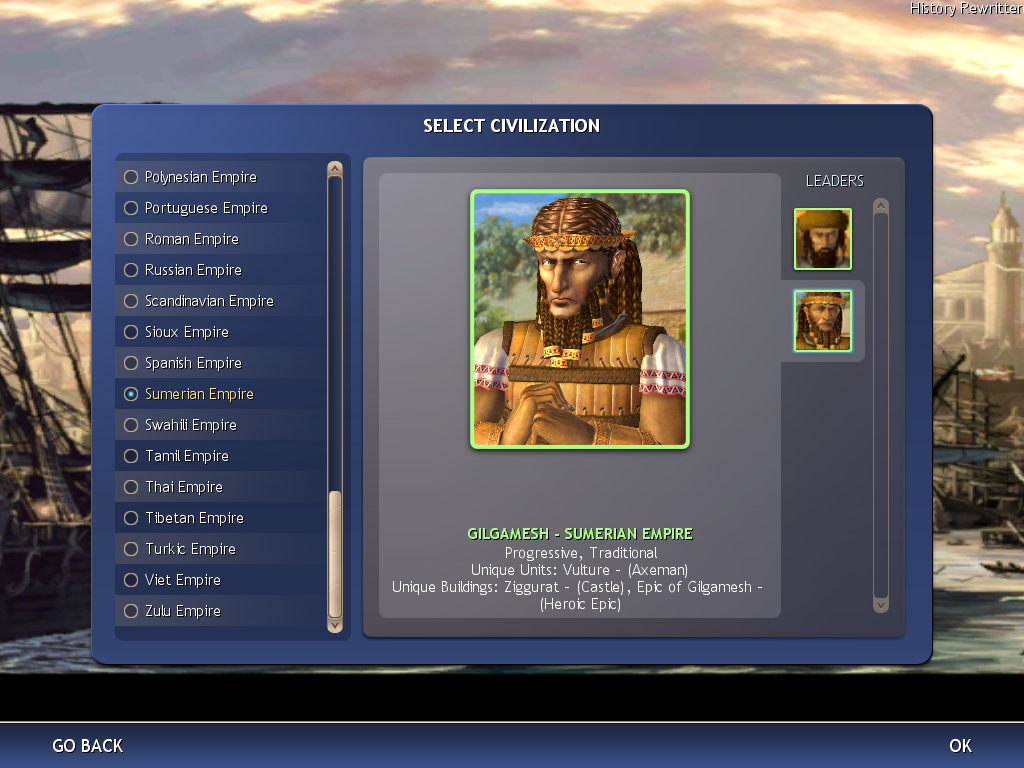







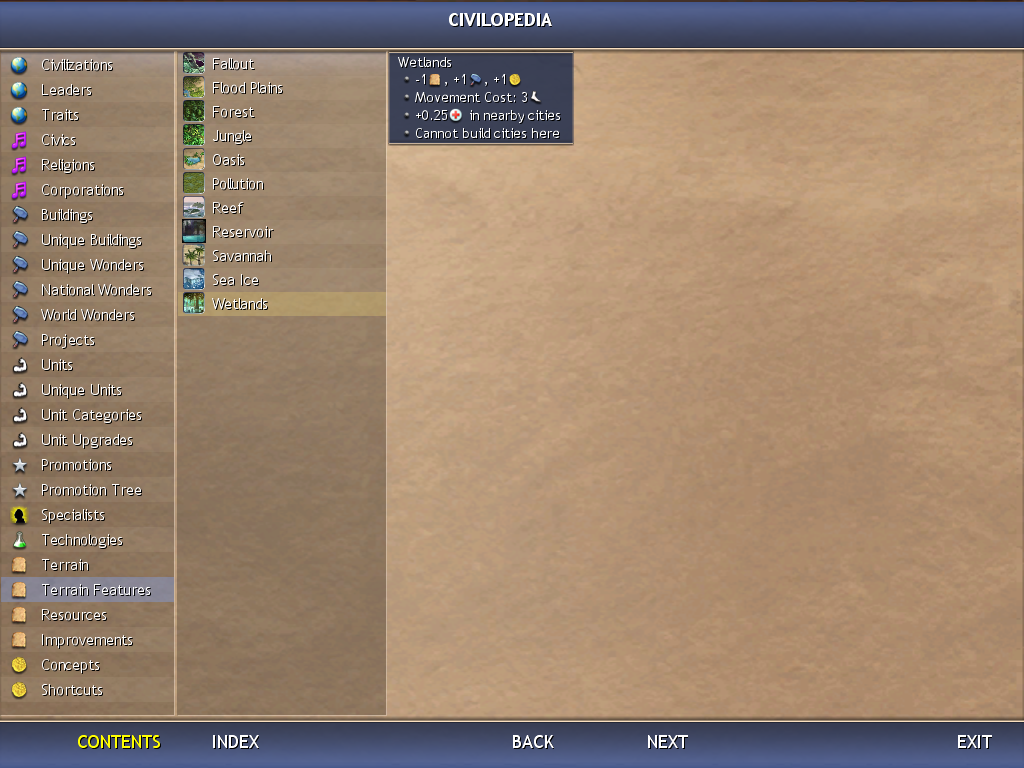








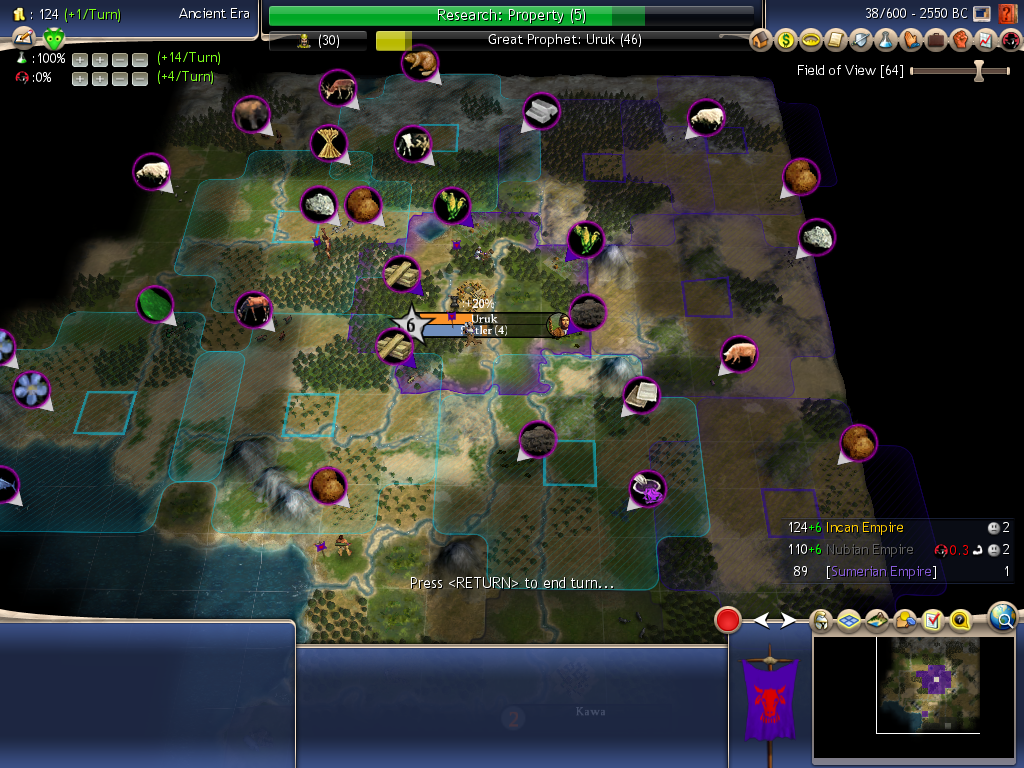


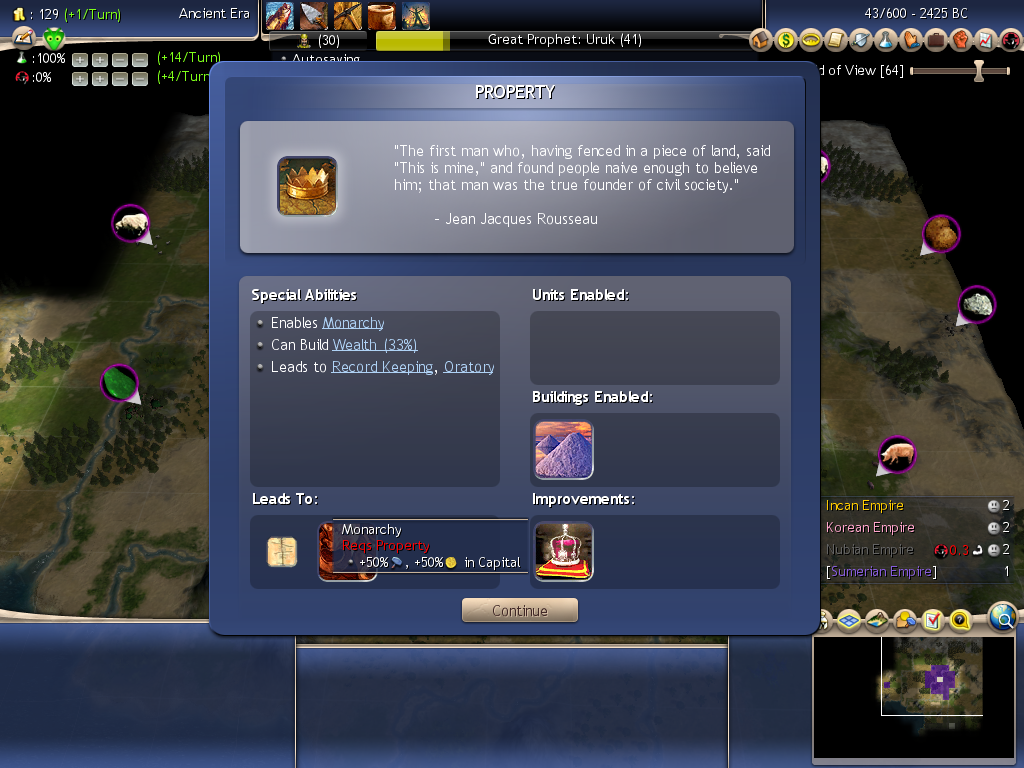




 per specialist
per specialist from
from 
 per city
per city
 per city
per city per city
per city

